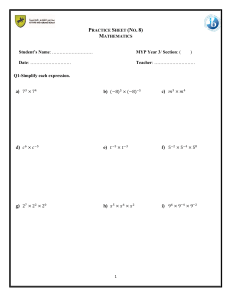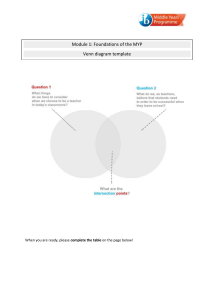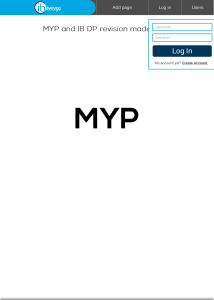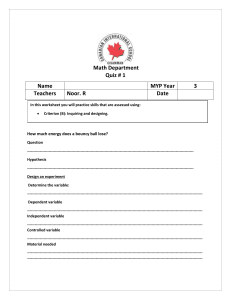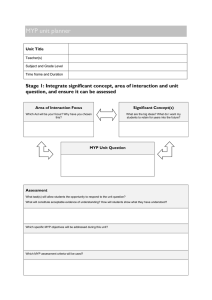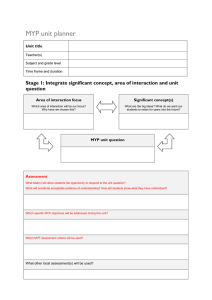MYP Guidelines: Teaching, Assessment, and Interdisciplinary Learning
advertisement
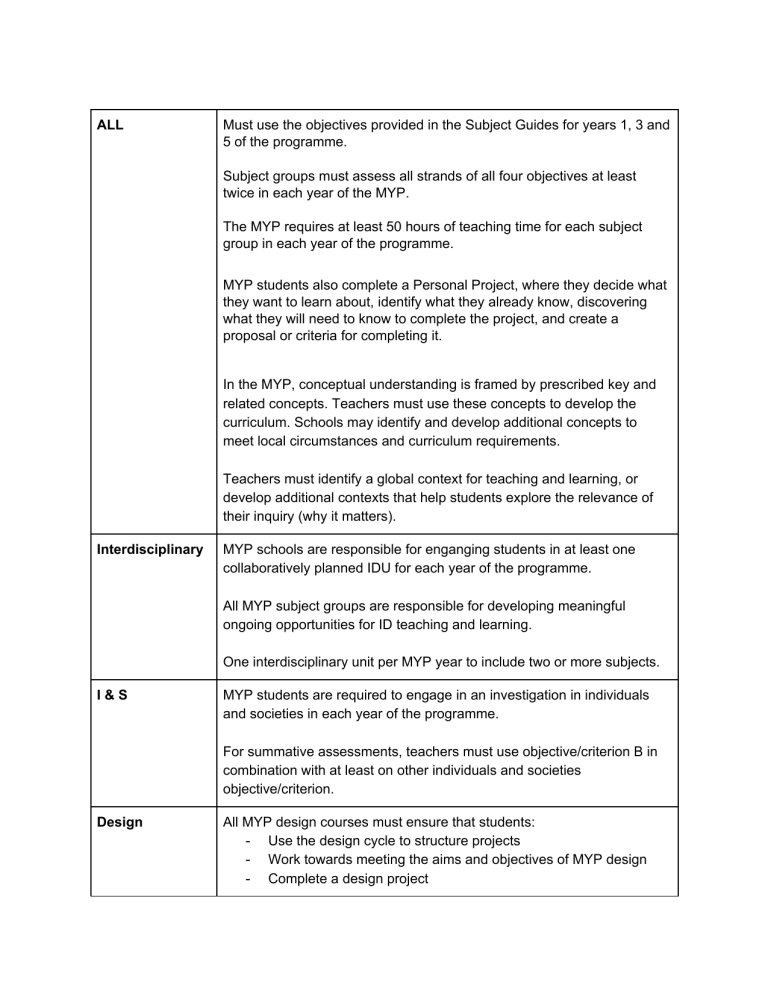
ALL Must use the objectives provided in the Subject Guides for years 1, 3 and 5 of the programme. Subject groups must assess all strands of all four objectives at least twice in each year of the MYP. The MYP requires at least 50 hours of teaching time for each subject group in each year of the programme. MYP students also complete a Personal Project, where they decide what they want to learn about, identify what they already know, discovering what they will need to know to complete the project, and create a proposal or criteria for completing it. In the MYP, conceptual understanding is framed by prescribed key and related concepts. Teachers must use these concepts to develop the curriculum. Schools may identify and develop additional concepts to meet local circumstances and curriculum requirements. Teachers must identify a global context for teaching and learning, or develop additional contexts that help students explore the relevance of their inquiry (why it matters). Interdisciplinary MYP schools are responsible for enganging students in at least one collaboratively planned IDU for each year of the programme. All MYP subject groups are responsible for developing meaningful ongoing opportunities for ID teaching and learning. One interdisciplinary unit per MYP year to include two or more subjects. I&S MYP students are required to engage in an investigation in individuals and societies in each year of the programme. For summative assessments, teachers must use objective/criterion B in combination with at least on other individuals and societies objective/criterion. Design All MYP design courses must ensure that students: - Use the design cycle to structure projects - Work towards meeting the aims and objectives of MYP design - Complete a design project PHE MYP physical and health education courses must engage students in physical education activities for at least 50 percent (50%) of the total teaching time allocated to this subject. Students must complete an aesthetic movement routine that is assessed against criterion B (planning for performance) in every year of the programme. Lang & Lit Each MYP language and literature course must include study of a balance of language and literature. Language learning in context, language acquisition and literature all play a key role in constructing the language and literature curriculum and provide a natural entry point to inquiry-based learning. Each MYP language and literature course must include study of a balance of genres. Teachers must ensure that students have the opportunity to study a range of different text types; ● short fiction and long fiction ● extracts ● full-length works ● poetry, drama ● non-fiction and visual texts Each MYP language and literature course must include study of a range of literature, that includes: ● poetry, prose (short stories and novels) ● mythology ● drama, and ● in some cultures, literature also includes autobiography ● biography, graphic novels ● travelogues ● satires ● essays, letters, ● literary non-fiction ● speeches, oral traditions ● screenplays, film and episodic television Each year of each MYP language and literature course must include a world literature component. In the MYP, world literature means literature from different parts of the world and works in translation, each of which clearly shows diverse cultures. Science In every year of MYP sciences, all students must independently complete a scientific investigation that is assessed against criterion B (inquiring and designing) and criterion C (processing and evaluating). Although schools may vary the structure of the sciences curriculum throughout the five years of the programme, they should offer either discrete or modular science courses. Discrete - generally encompass biology, chemistry and physics but may include other science disciplines. Modular - include two or more discrete sciences taught in rotation. Lang Acquisition It is a requirement that schools provide sustained language learning in at least two languages for each year of the MYP. Students must be able to study at least: - One additional language (or a second language from the language and literature subject group) sustained across the entire year in each year of the MYP - The same additional language in each year of the MYP, or achieve a satisfactory proficiency in phase 4 in order to transfer to another language. (It is up to each individual school to determine the grade deemed as satisfactory for the transfer to be approved.) Math Within the prescribed framework, all MYP mathematics courses should ensure that students: - Apply mathematics to authentic real-life situations - Perform investigations to discover patterns Topics and skills of the framework for mathematics are organised so that students can work at two levels of challenge: standard mathematics and extended mathematics. The Arts All schools must ensure that: - In MYP years 1-3, students engage in a minimum of one visual arts discipline and one performing arts discipline. - The sum of arts subject group house in MYP years 1-3 meets the minimum requirement of 150 hours, of which a minimum total of 50 hours must be dedicated to visual arts and a minimum total of 50 hours must be dedicated to performing arts. The remaining 50 hours may be allocated to any arts subject(s) at the discretion of the school. - Students must use the arts process journal in all MYP arts courses. The process journal is a generic term used to refer to the self-maintained record of progress that students have made through the arts...It can be written, visual, audio or a combination of these and may include both paper and electronic formats. Students may develop their own format and design, although schools can provide templates or examples in order to support students’ work. Students must show evidence of regular use of the process journal, though not necessarily weekly. Though legibility is important, the recording of critical and creative thinking and reflection is more important than neatness and presentation. All four arts objectives [A,B,C,D] must be evidenced through the arts process journal. Visual arts - visual art and media Performing arts - drama, music and dance
